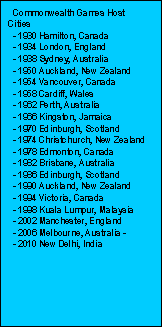|
|
GAMES |
||||
  |
HISTORY OF THE COMMONWEALTH GAMES The
first Commonwealth Games took place in Hamilton, Ontario, Canada in
1930. Bobby Robinson, a key force within athletics in Canada, finally
implemented the event that had been talked about amongst Commonwealth
nations for over thirty years. Eleven countries boasting 400 athletes
in total participated in the first Games. $30,000 was provided by the
City of Hamilton to these nations in order to defray travel costs. Since then, the Games have been conducted every four years except for 1942 and 1946, due to World War II. Sixteen Games have been held in total, with three of these hosted by Australian cities - Sydney 1938, Perth 1962 and Brisbane 1982. From 1930 to 1950 the Games were known as the British Empire Games, then the British Empire and Commonwealth Games until 1962. From 1966 to 1974 they took on the title of British Commonwealth Games and from 1978 onwards they have been known as simply the Commonwealth Games. While other Games around the globe have been founded on geographic or climatic factors such as the Asian, Pan Am, African Games and Winter Olympics, the Commonwealth Games has been founded on history. Unique characteristics of the Commonwealth Games include being the only Games, which share a common language. All athletes and officials can converse with each other in English, creating an atmosphere that has led to the Commonwealth Games being long known as the "Friendly Games". In an effort to keep the Games vibrant and relevant, the Commonwealth Games Federation (CGF) allowed Kuala Lumpur in 1998 to include team sports for the first time, a decision that proved an outstanding success. The challenge that lies before Melbourne is to perpetuate the evolution of the Games so as to maintain its historical position of strength on the world event stage. Unlike other sporting occasions, the Commonwealth Games brings together nations from every corner of the world in a unique family spirit of shared history, of common experiences, of a uniting language, of links that transcend cultural barriers and physical borders. The bonds of the Commonwealth Games help to encourage and support the pursuit of health and fitness in each of the member countries and provide an inspiration for youth to strive for excellence. Every four years, the nations of the Commonwealth gather to enjoy the friendship, entertainment and sporting performances that makes the Commonwealth Games the most tangible mortar that binds together this unique family of nations. |
||||
|
|
|||||
